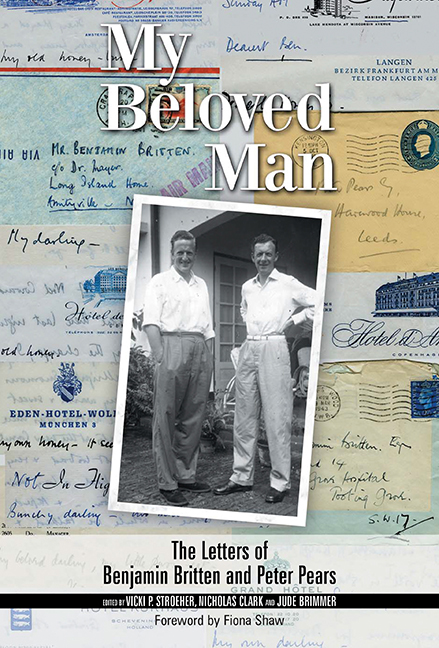Book contents
- Frontmatter
- Dedication
- Frontispiece
- Contents
- List of Plates
- List of Illustrations
- Foreword by Fiona Shaw
- Acknowledgements
- Editorial Note
- Introduction: Britten and Pears's ‘personal and consistent’ Correspondence
- THE LETTERS
- I ‘When I am not with you’: August 1937 to January 1941: Letters 1–12
- II ‘My life is inextricably bound up in yours’: May 1942 to November 1944: Letters 13–70
- III ‘I don't know why we should be so lucky, in all this misery’: July 1945 to April 1949: Letters 71–125
- IV ‘You are potentially the greatest singer alive’: Late 1949 to January 1954: Letters 126–88
- V ‘Why shouldn't I recognise that you are such a large part of my life’: May 1954 to December 1959: Letters 189–246
- VI ‘Far away as you are, at least I feel there is contact!’: January 1960 to March 1968: Letters 247–313
- VII ‘It is you who have given me everything’: January 1970 to June 1975: Letters 314–53
- VIII ‘My days are not empty’: January to November 1976: Letters 354–65
- Personalia
- List of Works
- Select Bibliography
- General Index
- Plate section
IV - ‘You are potentially the greatest singer alive’: Late 1949 to January 1954: Letters 126–88
from THE LETTERS
Published online by Cambridge University Press: 05 July 2016
- Frontmatter
- Dedication
- Frontispiece
- Contents
- List of Plates
- List of Illustrations
- Foreword by Fiona Shaw
- Acknowledgements
- Editorial Note
- Introduction: Britten and Pears's ‘personal and consistent’ Correspondence
- THE LETTERS
- I ‘When I am not with you’: August 1937 to January 1941: Letters 1–12
- II ‘My life is inextricably bound up in yours’: May 1942 to November 1944: Letters 13–70
- III ‘I don't know why we should be so lucky, in all this misery’: July 1945 to April 1949: Letters 71–125
- IV ‘You are potentially the greatest singer alive’: Late 1949 to January 1954: Letters 126–88
- V ‘Why shouldn't I recognise that you are such a large part of my life’: May 1954 to December 1959: Letters 189–246
- VI ‘Far away as you are, at least I feel there is contact!’: January 1960 to March 1968: Letters 247–313
- VII ‘It is you who have given me everything’: January 1970 to June 1975: Letters 314–53
- VIII ‘My days are not empty’: January to November 1976: Letters 354–65
- Personalia
- List of Works
- Select Bibliography
- General Index
- Plate section
Summary
The early 1950s found Pears and Britten both flourishing with success, bolstered by an increase in commissions for new works from Britten and demand for Pears as a soloist, both in the UK and abroad. In addition to the hard work of composing and performing, they continued to oversee the English Opera Group, which experienced numerous financial and administrative difficulties, and to develop and expand the Aldeburgh Festival in keeping with their own standards and philosophical outlook. However, there came expectations of even greater achievement from audiences, critics, fellow musicians and, most significantly, from themselves.
By this time, Pears was in demand as both a concert artist and on the operatic stage, but with increasing pressures to perform he began to suffer from throat problems. Not surprisingly, he felt insecure about being unable to sing at his best before an audience. Thus, Britten's letters during this period are filled with reassurance; for example, after listening to a broadcast of Bach's St Matthew Passion, he writes ‘The voice sounds so full & so rich, & with so much variety, & this glorious musical phrasing […] There can never have been an Evangelist like you – it's wonderful to be born in your lifetime to hear you do it’ (Letter 158). With the weight of such high standards, it is no wonder that both men became so critical of their individual abilities and relied upon their appraisal of one another to ease their doubts. Britten acknowledges this in a letter of March 1951: ‘It was lovely to play [Billy Budd] to you, & you gave me back my confidence which had been slowly ebbing away. In a work of this size & tension that is one of one's greatest problems. I believe that is yours too – if one aims high (& you achieve your aims so often) one is so desparately ashamed when one knows one is missing them’ (Letter 157).
In truth, both men were working themselves to the point of exhaustion. Britten's physical ailments, coupled with the time constraints from working on two complex and significant operas – Billy Budd for the 1951 Festival of Britain and Gloriana, composed in honour of Queen Elizabeth II's coronation in 1953 – resulted in his being unable to give recitals with Pears as frequently as in the past.
- Type
- Chapter
- Information
- My Beloved ManThe Letters of Benjamin Britten and Peter Pears, pp. 149 - 202Publisher: Boydell & BrewerPrint publication year: 2016

